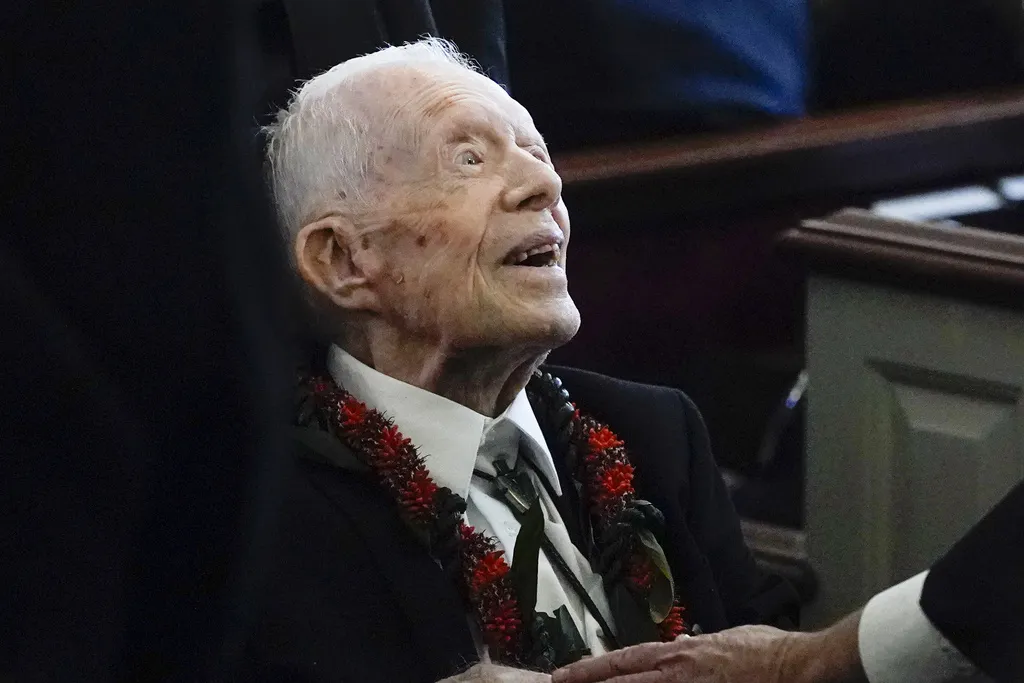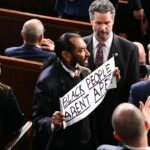

Former President Jimmy Carter, a onetime naval officer and peanut farmer who became the 39th president of the United States after promising citizens he would never lie to them, has died at the age of 100.
Carter’s death marked the end of the longest life of any former U.S. president. George H.W. Bush, who previously held the record, died in 2018 at 94. Carter and his wife Rosalynn, who died on Nov. 19, 2023, were married for 77 years, which is also the record for the longest marriage of a presidential couple.
Carter entered hospice care in Georgia to “spend his remaining time at home with his family” instead of additional medical intervention, the Carter Center announced on Feb. 18, 2023.
A one-term president from 1977 to 1981 who presided over a stagnant economy and a series of foreign policy setbacks, Carter enjoyed substantial popularity and goodwill in the decades after leaving office. He was particularly well-known for his work with the housing nonprofit organization Habitat for Humanity and was regularly photographed helping build homes in his later years.
JIMMY CARTER LOOKS HEROIC COMPARED TO JOE BIDEN
A Naval Academy graduate, Carter served from his graduation in 1946 until 1953, when he left active duty after the death of his father to take over his family’s farm. He married his wife, Rosalynn, in 1946.
He began his political career in 1963 as a Georgia state senator, running on the platform of racial inclusion and integration. Four years later, he ran for the state’s governorship for the first time, losing in the Democratic primary and returning to agriculture and private life. In 1970, Carter won the crucial Democratic primary and the Georgia governorship. His four-year stint in the statehouse included signing civil rights legislation and expanding social services.
Carter next turned his eye to the White House. Starting out as an asterisk in the polls, through sheer force of will and by shaking hands with hundreds of thousands of people, he defeated a large Democratic field — including California Gov. Jerry Brown and Alabama Gov. George Wallace — in the race to take on incumbent President Gerald Ford, a Republican.
Carter and his running mate, Sen. Walter Mondale (D-MN), defeated Ford in a competitive race with 297 electoral votes and 50.1% of the popular vote. Ford’s popularity took a hit after he pardoned former President Richard Nixon. An unelected president who ascended due to the resignations of Nixon and former Vice President Spiro Agnew, Ford governed in the shadow of the Watergate scandal. He also faced criticism over the controversial end to the Vietnam War, while Carter vowed to bring honesty and ethics back to government.
The Carter-Mondale ticket took office in 1977, with the economy in near-recession and suffering from high inflation. That toxic combination came to be known as “stagflation” and Carter struggled with it throughout his presidency, compounded. The energy crisis, driven by a combination of Carter’s domestic policies and panic over the falling global oil supply following the 1979 Iranian Revolution, would again lead the country into an economic downturn in 1980. Other major domestic initiatives included the establishment of the Department of Education, which his 1980 presidential rival Ronald Reagan pledged to dismantle.
Internationally, Carter positioned himself as a champion of human rights, in opposition to the Soviet Union and other regimes. But Carter’s term was seen as a period in which the United States lost ground in the Cold War, with the Soviet invasion of Afghanistan and inroads in the developing world. He led negotiations of the 1979 peace treaty between Israel and Egypt, negotiating the previous year’s Camp David agreement. He also helped establish diplomatic relations with the People’s Republic of China, a process begun under Nixon seven years earlier.
The seizure of 66 U.S. Embassy staff in Iran following that country’s revolution dominated headlines over the last 14 months of Carter’s presidency. A failed U.S. rescue attempt, which led to the deaths of eight troops after diplomatic efforts failed, largely contributed to his landslide defeat by Reagan in 1980. Carter was also weakened by a Democratic primary challenge from Sen. Ted Kennedy of Massachusetts, a liberal icon.
He carried only six states and the District of Columbia while running 10 points behind Reagan in the popular vote as Republicans also won control of the Senate for the first time since the 1950s.
Following Carter’s landslide defeat, the Democrats became associated with inflation, economic mismanagement, and foreign policy weakness. While he did begin deregulation and modest boosts to the defense budget, these perceptions became further entrenched with the Reagan economic boom and a defense build-up that won the Cold War, eventually leading to the disintegration of the Soviet Union itself under Republican rule. Democrats endured a 12-year exile from the White House after Carter.
Carter devoted much of his post-presidency to charitable efforts. His establishment of the Carter Center and its work fighting diseases, such as Guinea worm and river blindness, and promotion of peace earned him the Nobel Peace Prize in 2002. He regained much of his popularity in retirement.
Then President Bill Clinton dispatched him to Haiti to negotiate peace after a coup, leading a delegation that included Colin Powell and Sen. Sam Nunn. That year, Carter also traveled to North Korea in an attempt to resolve international concerns about the communist regime’s nuclear program. The trip momentarily defused tensions and paved the way for the 1994 Agreed Framework, but Pyongyang’s nuclear ambitions remained and Carter was criticized for freelance diplomacy without adequately consulting the Clinton administration about his negotiations.
The former president also continued to teach Sunday school at his local Baptist church. A born-again Christian, his faith drove much of his humanitarian work, as well as his human rights advocacy and support for racial equality. Yet under Carter’s watch, evangelicals shifted their political allegiance to the Republicans. Carter was uncomfortable by the Democratic Party’s leftward lurch on abortion after he left office, but the parties increasingly sorted on social issues in the 1980s and ’90s.
“I have never believed that Jesus would be in favor of abortion, unless it was the result of rape or incest, or the mother’s life was in danger. That’s been the only conflict I’ve had in my career between political duties and Christian faith,” Carter said in an interview in 2012. “Of course, the Supreme Court ruled differently. Within the ruling, I tried to minimize abortion as best I could. On the issue of abortion, my beliefs are contradictory to what the Supreme Court ruled.”
The Carter Center nevertheless pronounced itself “deeply disappointed” that Roe v. Wade was overturned last year, in a statement that did not come directly from the former president himself.
Rosalynn Carter played an active role in her husband’s political career as his closest adviser. In addition to her work as first lady, such as advocating for mental health issues, and her busy campaign schedule, Mrs. Carter frequently attended Cabinet meetings, and met with foreign leaders.
CLICK HERE TO READ MORE FROM THE WASHINGTON EXAMINER
Carter suffered a number of medical episodes in recent years, having multiple surgeries. Carter was unable to attend President Joe Biden‘s inauguration, but the current president and his wife Jill visited the Carters at their home during a trip to Georgia. Carter also made a rare public appearance at his wife’s funeral service, despite having been in hospice care for ten months by that time. The former president did not address mourners, however.
He is survived by his four children: Amy, John, Donnel, and James Carter III.





